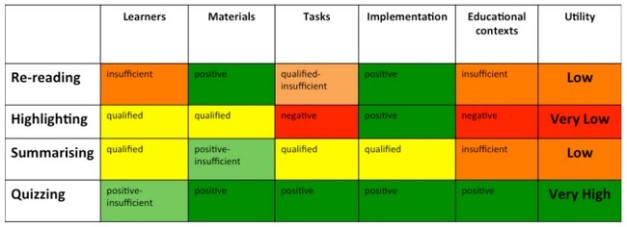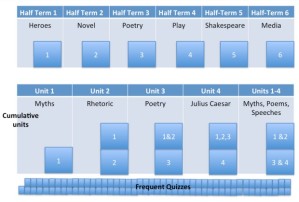Note: This post summarises the excellent research in the following blog, focusing on the key educational theories and how they may best be put into practice in the classroom. All content remains that of the original author cited below, though any errors and omissions are my own.
Author: Joe Kirby
https://pragmaticreform.wordpress.com/2014/05/05/scientificcurriculumdesign/
One Scientific Insight for Curriculum Design (2014)
Scientific research converges on one key insight:
- Repeated retrieval improves long-term retention: *frequent quizzing prevents forgetting*
2013
Five cognitive scientists collate hundreds of studies on long-term memory retention (Dunlosky, Rawson, Marsh, Nathan, Willingham 2013)
Finding: ‘Practice testing’ has a higher utility for retention and learning than other techniques.
Quizzing Outperforms Often-Used Techniques
Cognitive psychologists (Roediger, Putnam and Smith 2011) have summarised from this research many benefits of low-stakes testing:
QUESTION?
What is the optimal format and frequency of low-stakes testing?
Format
Applied research suggests multiple-choice questions are as effective as short-answer questions.
| What is the optimal format for quizzes? | |
| Short Answer? | |
| McDaniel et al. 2007
Short-answer tests benefit subsequent test performance more than do multiple-choice tests. |
Kang et al. 2007
Regular SA quizzes may be more efficient in aiding student learning than taking a MC quiz. |
|
Multiple Choice? |
|
| Smith & Karpicke 2013
Little or no advanateg of answering SA questions over MC questions in 3 experiments. |
McDermott et al. 2014
Multiple choice quizzing is as effective as short-answer quizzing. |
Frequency
| What is the optimal frequency for quizzing?
|
| Is a more regular frequency better?
· ‘shorter and more frequent quizzes outperform longer and less frequent (one a week rather than only 2 or 3 a term).’ · ‘gains continue to increase as frequency increases.’ |
| Is a spaced frequency better?
· ‘The greater the effort to retrieve learning, provided that you succeed, the more learning is strengthened by retrieval.’ (Dunlosky, et al, 2013). Eight recommendations for effective quizzing |
1) Use frequent quizzing: testing interrupts forgetting
2) Roll forward into each successive quiz questions on work from the previous term.
3) Design quizzing to reach back to concepts and learning covered earlier in the term, so retrieval practice continues and learning is cumulative.
4) Frequent low-stakes quizzesin class helps the instructor verify that students are in fact learning as well as they appear to be and reveal the areas where extra attention is needed. Cumulative quizzing is powerful for consolidating learning and concepts from one stage of a course into new material encountered later.
5) Simply including one test retrieval practicein a class yields a large improvement in final exam scores, and gains continue to increase as the frequency of testing increases.
6) Effortful retrieval makes for stronger learning and retention. The greater the effort to retrieve learning, *provided that you succeed*, the more learning is strengthened by retrieval.
7) In virtually all areas of learning, you build better mastery when you use testing as a tool
8) One of the best habits to instill in a learner is regular self-quizzing.
What might a curriculum and assessment system designed around principles of cumulative retrieval look like in practice?
Top = traditional curriculum design; Bottom = curriculum reimagined and redesigned to put frequent, cumulative retrieval practice at its heart.
Further reading on quizzing and retrieval practice
Improving Students’ Learning with Effective Learning Techniques: Promising Directions from Cognitive and Educational Psychology. Dunlosky, Rawson, Marsh, Nathan & Willingham 2011.
Repeated Retrieval Is the Key to Long-Term Retention. Karpicke & Roediger 2007
Retrieval practice is critical in long-term retention. Roediger & Butler 2010
Test-enhanced learning: Taking memory tests improves long-term retention.Roediger & Karpicke 2006
Test-Enhanced Learning in a Middle School Science Classroom: The Effects of Quiz Frequency and Placement. McDaniel, Agarwal, Huelser, McDermott & Roediger 2011
Test-Enhanced Learning in the Classroom: Long-Term Improvements From Quizzing. Roediger et al 2011
Generalising test-enhanced learning from the laboratory to the classroom. McDaniel et al 2011
Quizzing promotes transfer in science exams. McDaniel 2011
The power of testing memory: Basic research and implications for educational practice. Roediger & Karpicke 2006
Both multiple-choice and short-answer quizzes enhance later exam performance in middle and high school classes. McDermott 2014
Retrieval practice with short-answer, multiple-choice, and hybrid tests. Smith & Karpicke 2013
Repeated Testing Produces Superior Transfer of Learning Relative to Repeated Studying Butler, 2010



